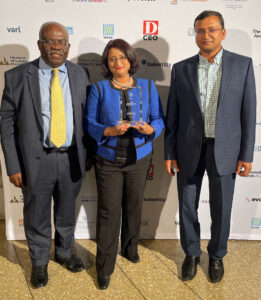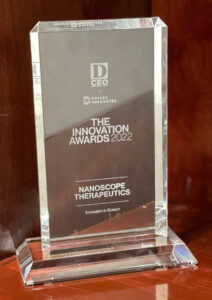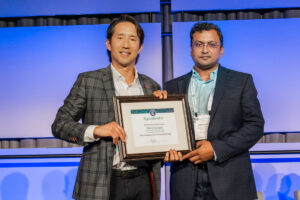Nanoscope’s Clinical and Scientific Advances in Optogenetics to be Featured at ASGCT Annual Meeting, May 16-19, 2022 in Washington, DC
DALLAS, May 13, 2022 — Nanoscope Therapeutics Inc., a clinical-stage biotechnology company developing optogenetic therapies for treatment of retinal degenerative diseases, today announced four presentations on the Company’s clinical development and research programs at the 25th Annual Meeting of the American Society of Gene and Cell Therapy (ASGCT), May 16-19, 2022, at the Walter E. Washington Convention Center in Washington, D.C. The international convention (in-person and virtual) attracts thousands of scientists, patient advocates, physicians, and government officials.
“Nanoscope will be highlighting its MCO-010 clinical gene therapy program that demonstrated vision restoration in people blinded by retinal diseases as well as pioneering nonviral laser delivery of MCO-020 gene therapy for geographic atrophy and optogenetic modulation of neurological disorders,” said Sulagna Bhattacharya, CEO of Nanoscope.
ASGCT will feature two presentations on MCO-010 and two on MCO-020 (all times are U.S. EDT):
Monday, May 16, 3:45 pm – 5:30 pm, Salon H
Synthetic Nanoparticle-Based Gene Transfer oral abstract presentation
In Vivo Spatially Targeted Nonviral Optical Delivery of Genes in Mice to NHPs, Monday, May 16, 4:15 – 4:30
pm – Sanghoon Kim, Ph.D.
Monday, May 16, 5:30 pm – 6:30 pm, Hall D
Ophthalmic and Auditory Diseases poster session
Optogenetic Gene Therapy for Treatment of Inherited Retinal Disorders in a Gene Agnostic Manner [Board No.
M-174] – Subrata Batabyal, Ph.D.
Neurologic Diseases I poster session
Optogenetic Modulation of the Central Nervous System for Pain [Board No. M-152] – Darryl Narcisse, M.D.
Tuesday, May 17, 5:30 pm – 6:30 pm, Hall D
Gene and Cell Therapy Trials in Progress poster session
AAV Intravitreal Optogenetic Therapy for Vision Restoration in Patients with Severe Retinal Dystrophy [Board
No. Tu-306] – Samarendra Mohanty, Ph.D.
About Nanoscope Therapeutics Inc.
Nanoscope Therapeutics is developing optogenetic therapies to give sight to millions of patients suffering from retinal degenerative diseases. Nanoscope’s lead product, MCO-010, is an investigational AAV gene therapy designed to restore functional vision to patients with severe vision loss due to retinal degeneration. In a Phase 1/2a open label trial (NCT04919473) of MCO-010 in patients with advanced RP (n=11), MCO-010 demonstrated a favorable safety profile and several patients experienced restoration of vision to a level sufficient to resume activities of daily living. A multicenter, randomized, double-masked, sham-controlled Phase 2b clinical trial of MCO-010 for treatment of RP (NCT04945772) is fully enrolled (N=27) and in follow-up. Primary data are expected in H1-2023. The company is initiating Phase-2 clinical trials for Stargardt macular degeneration in Q2-2022. MCO therapy received orphan drug designations from the FDA for RP and Stargardt.
Contact:
Dan Eramian
Opus Biotech Communications
pr@nanostherapeutics.com
425-306-8716













 “Biotech Innovation requires passion and perseverance. When we started 12 years back, gene therapy held promise and hope. Now, in this exciting era of gene therapy, we are on the cusp of bringing restorative therapy for blindness caused by retinal degenerative diseases,” said Samarendra Mohanty, Co-Founder and President of Nanoscope.
“Biotech Innovation requires passion and perseverance. When we started 12 years back, gene therapy held promise and hope. Now, in this exciting era of gene therapy, we are on the cusp of bringing restorative therapy for blindness caused by retinal degenerative diseases,” said Samarendra Mohanty, Co-Founder and President of Nanoscope.



 Nanoscope won top company honors in the retina innovation category for exciting development of proprietary Multi-Characteristic Opsin (MCO) gene therapy platform for restoring vision in patients blinded by retinal degenerative diseases, such as retinitis pigmentosa (RP), regardless of genetic mutations. The technology was featured in a presentation by Samarendra Mohanty, Ph.D., Nanoscope Co-Founder and President.
Nanoscope won top company honors in the retina innovation category for exciting development of proprietary Multi-Characteristic Opsin (MCO) gene therapy platform for restoring vision in patients blinded by retinal degenerative diseases, such as retinitis pigmentosa (RP), regardless of genetic mutations. The technology was featured in a presentation by Samarendra Mohanty, Ph.D., Nanoscope Co-Founder and President.




